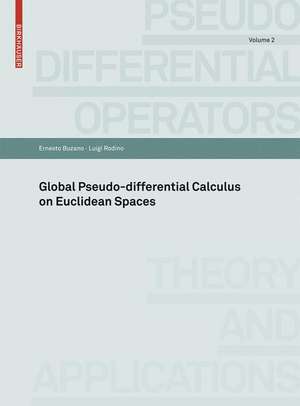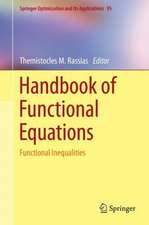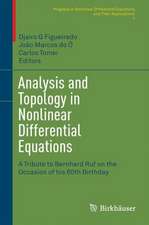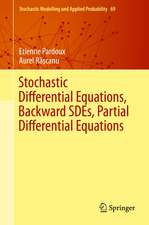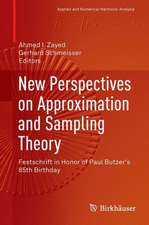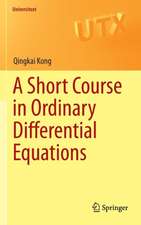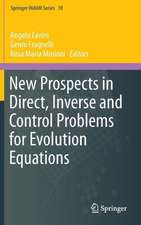Global Pseudo-differential Calculus on Euclidean Spaces: Pseudo-Differential Operators, cartea 4
Autor Fabio Nicola, Luigi Rodinoen Limba Engleză Paperback – 31 mai 2010
Preț: 519.58 lei
Preț vechi: 649.48 lei
-20% Nou
Puncte Express: 779
Preț estimativ în valută:
99.42€ • 103.60$ • 82.32£
99.42€ • 103.60$ • 82.32£
Carte tipărită la comandă
Livrare economică 31 martie-05 aprilie
Preluare comenzi: 021 569.72.76
Specificații
ISBN-13: 9783764385118
ISBN-10: 3764385111
Pagini: 316
Ilustrații: X, 306 p.
Dimensiuni: 165 x 235 x 17 mm
Greutate: 0.61 kg
Ediția:2010
Editura: Birkhäuser Basel
Colecția Birkhäuser
Seria Pseudo-Differential Operators
Locul publicării:Basel, Switzerland
ISBN-10: 3764385111
Pagini: 316
Ilustrații: X, 306 p.
Dimensiuni: 165 x 235 x 17 mm
Greutate: 0.61 kg
Ediția:2010
Editura: Birkhäuser Basel
Colecția Birkhäuser
Seria Pseudo-Differential Operators
Locul publicării:Basel, Switzerland
Public țintă
ResearchCuprins
Background meterial.- Global Pseudo-Differential Calculus.- ?-Pseudo-Differential Operators and H-Polynomials.- G-Pseudo-Differential Operators.- Spectral Theory.- Non-Commutative Residue and Dixmier Trace.- Exponential Decay and Holomorphic Extension of Solutions.
Recenzii
From the reviews:
“The authors present a nice unified approach for deriving pseudo-differential calculus on Rd and interesting recent results for classes of pseudo-differential operators defined globally on Rd. … The book is well written; an extended summary is given at the beginning of every chapter while at the end the authors provide comments and remarks that illustrate the historical background, previous contributions and references in the field. This book looks very interesting for researchers and Ph.D. students studying, broadly speaking, PDEs and pseudo-differential operators globally in Rd.” (Todor V. Gramchev, Mathematical Reviews, Issue 2011 k)
“Describes in a clear way the basic theory as well as new trends and results in global pseudo-differential operators calculus … . well written and organized at a difficulty level that precisely meets the target audience’s needs. Mathematics students as well as researchers in mathematical analysis will find this book an excellent resource to introduction into the field of pseudo-differential operator calculus. … serve as a textbook for graduate–level courses in pseudo-differential operators. … may also be useful and interesting for experienced PDEs researchers.” (Andrzej Myśliński, Control and Cybernetics, Vol. 39 (4), 2010)
“The subject of the book are pseudo-differential operators on Euclidean spaces. … The book is structured as follows. After a well-written introduction which summarizes the main ingredients of the book, the book starts with Chapter 0, which summarizes the relevant background. The main content is then structured in six chapters, each of which starts with a summary. This contributes to making the book accessible and pleasant to read.” (Bernd Ammann, Zentralblatt MATH, Vol. 1257, 2013)
“The authors present a nice unified approach for deriving pseudo-differential calculus on Rd and interesting recent results for classes of pseudo-differential operators defined globally on Rd. … The book is well written; an extended summary is given at the beginning of every chapter while at the end the authors provide comments and remarks that illustrate the historical background, previous contributions and references in the field. This book looks very interesting for researchers and Ph.D. students studying, broadly speaking, PDEs and pseudo-differential operators globally in Rd.” (Todor V. Gramchev, Mathematical Reviews, Issue 2011 k)
“Describes in a clear way the basic theory as well as new trends and results in global pseudo-differential operators calculus … . well written and organized at a difficulty level that precisely meets the target audience’s needs. Mathematics students as well as researchers in mathematical analysis will find this book an excellent resource to introduction into the field of pseudo-differential operator calculus. … serve as a textbook for graduate–level courses in pseudo-differential operators. … may also be useful and interesting for experienced PDEs researchers.” (Andrzej Myśliński, Control and Cybernetics, Vol. 39 (4), 2010)
“The subject of the book are pseudo-differential operators on Euclidean spaces. … The book is structured as follows. After a well-written introduction which summarizes the main ingredients of the book, the book starts with Chapter 0, which summarizes the relevant background. The main content is then structured in six chapters, each of which starts with a summary. This contributes to making the book accessible and pleasant to read.” (Bernd Ammann, Zentralblatt MATH, Vol. 1257, 2013)
Textul de pe ultima copertă
This book is devoted to the global pseudo-differential calculus on Euclidean spaces and its applications to geometry and mathematical physics, with emphasis on operators of linear and non-linear quantum physics and travelling waves equations.The pseudo-differential calculus presented here has an elementary character, being addressed to a large audience of scientists. It includes the standard classes with global homogeneous structures, the so-called G and gamma operators.Concerning results for the applications, a first main line is represented by spectral theory. Beside complex powers of operators and asymptotics for the counting function, particular attention is here devoted to the non-commutative residue in Euclidean spaces and the Dixmier trace.Second main line is the self-contained presentation, for the first time in a text-book form, of the problem of the holomorphic extension of the solutions of the semi-linear globally elliptic equations. Entire extensions are discussed in detail. Exponential decay is simultaneously studied.
Caracteristici
Addresses global pseudo-differential calculus and hypoellipticity Includes classic calculus as a special case Gives several applications to global problems in Euclidean spaces, including non-linear PDEs
